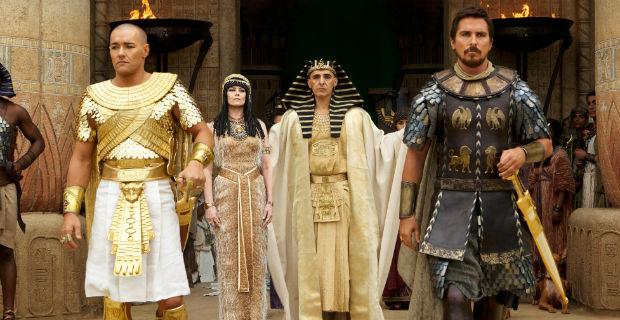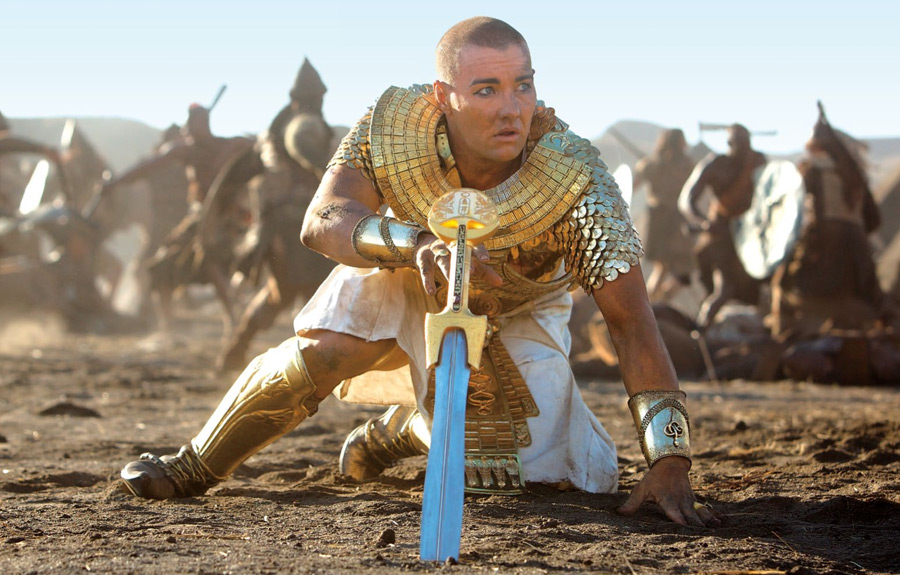Genre: Period
Premise: Moses takes revenge on his cousin Ramses after being cast off from the city he was supposed to help rule.
About: The biblical epic trend continues! We had Noah. Now we’ve got Moses. It’s a good bet that J-swizzle is getting his own movie soon. If you’re like me, you have no idea what any of this means. The Bible is one giant collection of words like “overfloweth.” Consider my cup confused. Exodus comes out in three weeks, stars Christian Bale as Moses and Joel Edgerton as Ramses. The film was directed by Ridley Scott.
Writer: Steve Zallian draft (previous drafts were written by Adam Cooper & Bill Collage)
Details: 7/6/13 draft – 132 pages
This wouldn’t be on my radar if it wasn’t for Steve Zallian writing this draft, one of the few screenwriters who’s worth the dough you pay him. The question is, can his writing overcome a film that has the special effects team that pixel-poked Dracula Year-Zero? I mean we know the guy’s a good writer. But you can’t write, “Don’t use bad green screen” in a slug line, can you?
Hey, here’s an idea for Hollywood. You’ve got this whole “Universe” approach going now. First it was Marvel superheroes. Then it was DC superheroes. Then it was Star Wars. Universal’s monsters are setting up their own universe.
Why not get some Bible Universe up in hurr!? You don’t even need the rights. I’m pretty sure the Old Testament is public domain by now (although I’m sure Disney’s trying to change that). Jesus was basically a superhero anyway, right? Came back from the dead if I’m not mistaken. Eat your heart out, Wolverine. Actually, I think I know why no one’s hopped on this chariot yet. The Bible’s stories don’t exactly lend themselves to Hollywood structure. As you’re about to find out with Exodus.
Exodus starts out strong. It’s 1300 B.C. The current Egyptian Pharaoh, Seti, is trying to decide who’s going to succeed him. On the one side he’s got his son Ramses, the hands on favorite. On the other, his nephew, Moses, who’s clearly the better leader.
One day during battle, Moses saves Ramses’ life, and because a prince is never supposed to need saving, Ramses doctors the history scroll to omit Moses’s act. This pisses Seti off, and has him seriously considering making Moses the next Pharaoh.
But then Ramses learns that Moses is the offspring of slaves! His whole life has been a lie. So Ramses casts him out of the city, and Moses goes on a spiritual journey where he becomes, of all things, a sheepherder.
One day while herding, non-believer Moses bumps his head and sees God, who tells him to go back and save all of Ramses’ slaves! Ramses threatens Moses once he arrives, so Moses uses his new God-like powers to turn the sea red, send disease at Ramses, rain down hail, and kill all of Ramses’ crops.
But it isn’t until Ramses actually gives Moses his slaves that Moses will face his most difficult test – getting all 400,000 of them home alive.
Whenever you write a swords and sandals pic, the danger is in getting lost in the grandiosity of it all. It can be scary stuff, trying to juggle so many characters and locations and subplots and passages of time. So your first order of business is to FIND YOUR CORE. You need to find what your story is REALLY ABOUT and place that front and center so the reader has something to grab onto.
With Exodus, that’s the relationship between Ramses and Moses. And Zallian (along with the earlier writers) does a really good job with this. All the cousins’ early interactions are laced with tension, a sub-textual jockeying for the throne. Remember that you want all your scenes to contain some element of conflict, tension, or suspense. We see that here.
And Moses was a really strong character overall. There’s this early sequence where he’s sent off to check on the slaves where he comes in contact with the slave king, Hegep. Hegep is a greedy car salesman type who has no respect for Moses and treats him like dirt the whole time he’s there. This is a writing trick we’ve talked about before on Scriptshadow. If you want to make us like your hero, put him around an asshole, someone who takes advantage of or disrespects him. We’ll immediately gain sympathy for your protag.
So things seemed to be going well. Strangely, however, this is the last moment in the script that contained any structure. We had this clear goal where we knew what Moses had to do and why he was doing it. But once he got back from the slave trip, the script turned into one of those slip and slides you see in the heat of summer, the screenplay equivalent of a runny nose.
Moses is cast out of the city and then sort of wanders around for awhile. He eventually finds a small farm and hangs out there for ten years. Then there’s a storm where he sees a burning bush (why is a burning bush such a big deal by the way? Isn’t it easy for a bush to burn?), and now, instead of clearly defined plot points guiding the story, we’re being pushed forward by symbols and ideas.
This is why clear goals and clear mysteries are SO IMPORTANT in screenwriting. When you tell us what our character needs to do and why, we feel a part of the story, like we know what’s going on. Seti says go find out why the slave owners are complaining. So we know that Moses needs to find out why the slave owners are complaining!
Where’s the goal in stumbling around on a farm and seeing a burning bush? It just felt… random. And I don’t know if that’s because Zallian was following the bible story or made the choice himself. But we needed structure here.
My guess is that Zallian was limited by the bible. 2000 years ago, they didn’t have 3rd acts with heroes overcoming their flaws right at the climactic moment of the story. Nor did everything end in an elevated battle. And that’s where Exodus really falters.
Ramses gives Moses his slaves and tells him to leave. And so the whole climax of the film is to… run away? Try to sell that on a modern-day project. I get that the climax here had to be the parting of the Red Sea, but even that was anti-climactic, as the parting was the slaves waiting for 12 hours until the tide made the sea shallow enough to walk across.
Satisfying character development also had to be sacrificed due to the Bible text. One of the storylines here was that Moses had no faith. He didn’t believe in God. Ideally, then, you want to play that out during the big Red Sea moment, where he had to believe in God to part those waters. The ultimate test of his faith and his flaw.
But we’d already spent the last 45 pages watching Moses use God to tear apart Ramses’ empire. So his battle with his faith was never in question by the time the Red Sea arrived, leading to a heck of an anti-climax. This is why Bible stories are so tricky. You can’t change the Bible to make the story better. You’re stuck with what they give you. And often that’s at odds with what mainstream audiences expect.
But the truth is, this script lost me all the way back in the second act. You have to recognize that period pieces are the genre most susceptible to becoming boring. It’s not like a comedy where a good joke can bring the reader back in, or horror where a good scare can do the same. If you get complacent and let the story slip away from you – meaning NOT MUCH HAPPENS for too long a period of time – the reader’s eyes will glaze over and they’ll stop caring.
Once Moses got to that outpost and became a sheepherder and just hung around all day, that was it for me. There wasn’t enough happening in the story to keep me invested. It’s true that period pieces need their “downtime” scenes, but that never means the scenes shouldn’t entertain. It’s your job to know when things are getting slow, and to look for ways to keep those scenes entertaining, as tough as it might be.
I still remember the scene in Braveheart where the two new Generals were brought in. The story was between big battles and could’ve easily gotten bogged down in a boring sequence. Instead, the next scene showed William Wallace hunting, and we find out one of the generals is an assassin here to kill him. The rest of the scene plays out with the second general saving Wallace’s life. That scene energized a potentially boring section.
Exodus started off strong, but ended like a day at church, with you discreetly checking your watch as the pastor prattled on.
[ ] what the hell did I just read?
[x] wasn’t for me
[ ] worth the read
[ ] impressive
[ ] genius
What I learned: Find your CORE for your period piece, which is almost always a key relationship between two characters. Here, it’s the relationship between cousins Ramses and Moses. Whenever you’re lost in your script then – things have gotten too big or too out of control – go back to that core. That’s your real story. Everything else is secondary.
P.S. If anyone wants to share their keys to making swords and sandals scripts (or period pieces in general) work, please do. The difficulty level on these scripts is so high. Any help will do.



